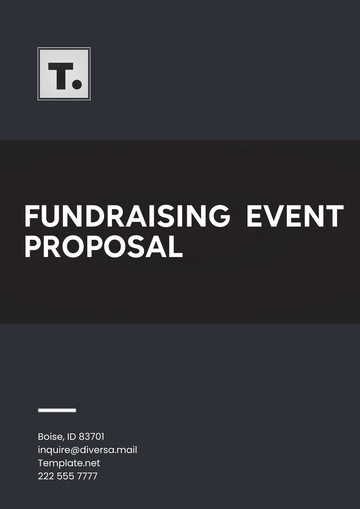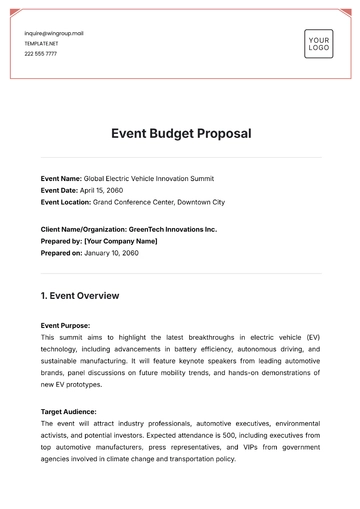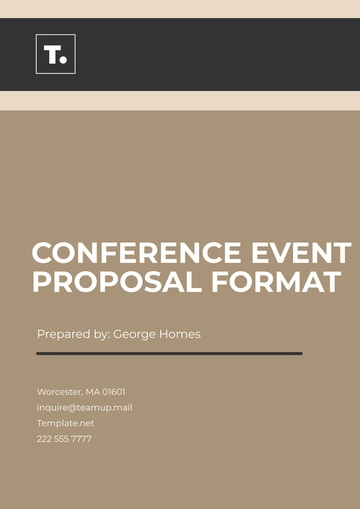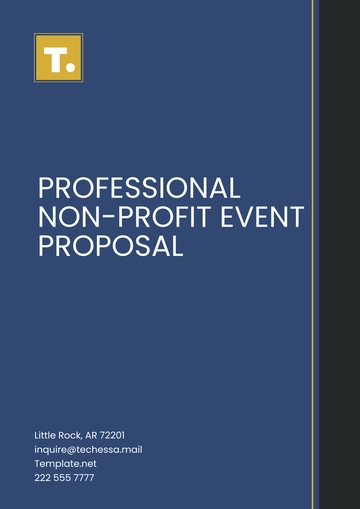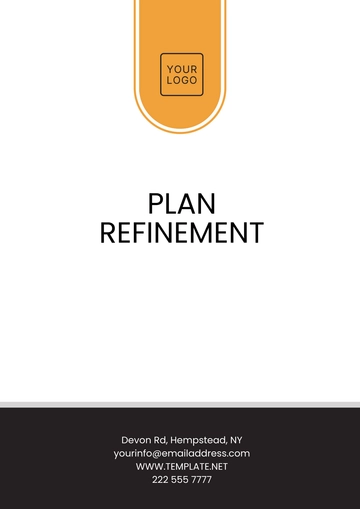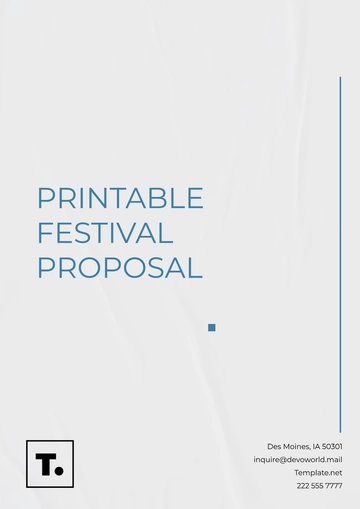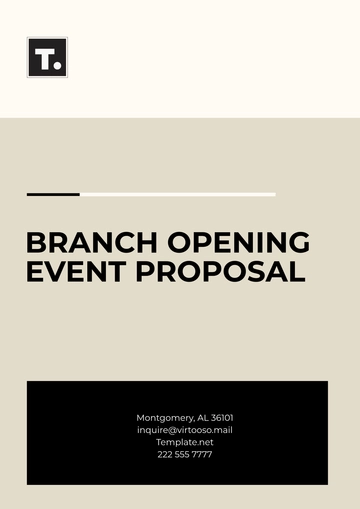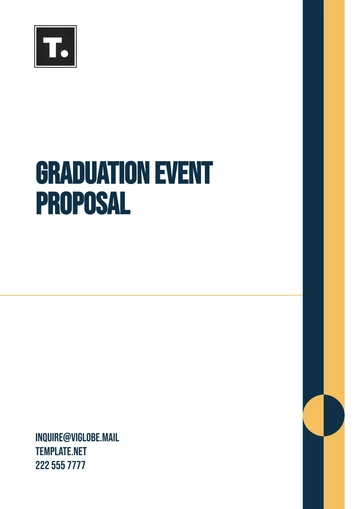Free Church Retreat Proposal
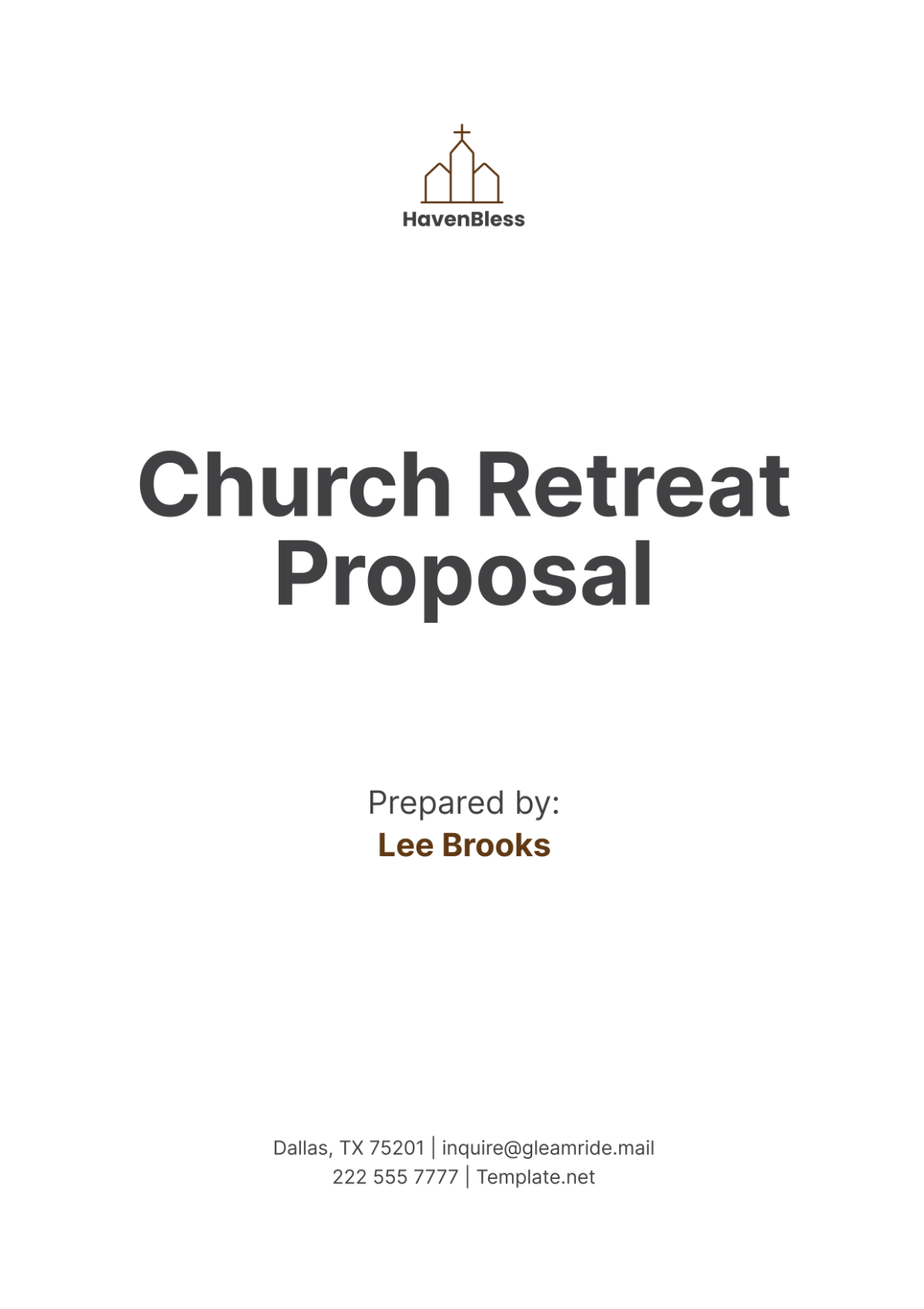
I. Introduction
This proposal outlines the planning and organization of the [Your Company Name]'s Annual Retreat for the year [2050]. The retreat aims to provide an opportunity for spiritual renewal, fellowship, and personal growth among congregants, strengthening community bonds and deepening individual faith through a series of thoughtfully designed activities and sessions.
A. Scope
The proposal includes the planning of retreat logistics, such as venue selection, scheduling of activities, budget allocation, and risk management. It covers all aspects necessary to ensure a successful and impactful retreat experience, from initial planning through execution and post-retreat evaluation.
II. Objectives of the Retreat
Defining clear objectives is essential to ensure that the retreat meets the spiritual, social, and personal growth needs of participants. These objectives guide the planning and execution of the retreat, ensuring that it delivers meaningful and memorable experiences.
A. Spiritual Renewal
Worship Sessions: Organized worship sessions will offer opportunities for collective prayer, praise, and reflection, aimed at rejuvenating participants' spiritual lives and reinforcing their faith.
Bible Study Groups: Structured Bible study groups will facilitate deeper engagement with scripture, allowing participants to explore and discuss spiritual themes in a supportive group setting.
Inspirational Talks: Inspirational talks by guest speakers and church leaders will provide valuable insights and encouragement, addressing various aspects of spiritual growth and personal development.
Meditation and Reflection: Time for personal meditation and reflection will be incorporated into the schedule, allowing participants to connect with God on a personal level and seek guidance for their lives.
B. Fellowship and Community Building
Group Activities: Collaborative activities and team-building exercises will be organized to strengthen relationships among participants and foster a sense of community.
Social Events: Social events, such as communal meals and informal gatherings, will provide opportunities for fellowship and relaxation, helping to build bonds among congregants.
Service Projects: Involvement in service projects will encourage participants to contribute to the community, demonstrating faith in action and fostering a spirit of generosity.
Recreational Activities: Recreational activities, including games and outdoor sports, will offer a balanced mix of fun and relaxation, promoting overall well-being and enjoyment.
C. Personal Growth
Workshops and Seminars: Workshops and seminars on personal development topics, such as leadership, communication, and wellness, will be included to support individual growth and empowerment.
Counseling and Support: Counseling sessions and support groups will be available for participants seeking guidance and assistance with personal or spiritual challenges.
Goal Setting: Opportunities for goal setting and planning will help participants identify and pursue their personal and spiritual goals, setting a path for continued growth beyond the retreat.
Feedback and Evaluation: Gathering feedback and evaluating the retreat experience will help identify areas for improvement and ensure that future retreats continue to meet participants' needs effectively.
III. Venue and Accommodation
Selecting the appropriate venue and arranging comfortable accommodations are crucial for the success of the retreat. This section details the considerations for venue selection and accommodation arrangements, ensuring that all logistical aspects are addressed to provide a conducive environment for retreat activities.
A. Venue Selection
Location: The venue will be chosen based on its suitability for hosting large groups, accessibility, and proximity to the church community. Ideally, it will offer a peaceful and conducive environment for reflection and fellowship.
Facilities: The venue must include adequate facilities for worship, group activities, and breakout sessions. This includes meeting rooms, dining areas, and recreational spaces.
Accessibility: The venue will be selected to ensure accessibility for all participants, including those with disabilities, with features such as ramps, elevators, and accessible restrooms.
Amenities: Essential amenities, such as comfortable lodging, catering services, and recreational facilities, will be considered to enhance the overall retreat experience.
B. Accommodation Arrangements
Lodging: Comfortable and clean lodging will be arranged for all participants, with options that cater to different needs and preferences, including shared and private rooms.
Meal Services: Catering services will provide balanced and nutritious meals, accommodating dietary restrictions and preferences to ensure that all participants are well-nourished throughout the retreat.
Transportation: Arrangements for transportation to and from the venue will be organized, including options for group transport and individual travel as needed.
Emergency Provisions: Emergency provisions, such as first aid kits and contact information for local medical services, will be in place to address any urgent needs that may arise during the retreat.
IV. Schedule and Activities
A well-structured schedule is essential for maximizing the retreat experience, ensuring that all planned activities are conducted efficiently and effectively. This section provides a detailed outline of the retreat schedule and the various activities that will be offered.
A. Daily Schedule
Morning Sessions: Each day will begin with a morning worship session, followed by breakfast and a morning Bible study or workshop.
Afternoon Activities: The afternoon will include group activities, recreational time, and service projects, with scheduled breaks for meals and relaxation.
Evening Programs: Evening programs will feature inspirational talks, communal dinners, and fellowship activities, concluding with time for reflection and prayer.
Free Time: Designated free time will allow participants to explore the venue, engage in personal activities, or relax as needed.
B. Special Events
Opening Ceremony: An opening ceremony will set the tone for the retreat, introducing participants to the schedule and objectives, and providing an opportunity for initial fellowship.
Guest Speaker Sessions: Special sessions with guest speakers will be scheduled to provide insights and inspiration on key topics related to spiritual growth and personal development.
Talent Show: A talent show will offer participants a chance to showcase their gifts and enjoy the diverse talents within the church community.
Closing Ceremony: The closing ceremony will wrap up the retreat, offering a final opportunity for reflection, sharing experiences, and expressing gratitude for the time spent together.
V. Budget and Financial Overview
A detailed budget is essential for managing the financial aspects of the retreat, ensuring that all costs are accounted for and that resources are allocated effectively. This section provides a comprehensive financial overview, including estimated costs and funding sources.
Category | Estimated Cost |
|---|---|
Venue Rental | $10,000 |
Accommodation | $15,000 |
Catering Services | $7,000 |
Transportation | $5,000 |
Activities and Materials | $3,000 |
Guest Speakers | $4,000 |
Contingency | $3,000 |
Total Estimated Budget | $47,000 |
This budget provides an overview of the estimated costs associated with the retreat, including venue rental, accommodation, catering, transportation, and other essential expenses. The contingency fund ensures that any unforeseen costs can be covered, maintaining financial stability throughout the planning and execution of the retreat.
VI. Risk Management
Effective risk management is crucial for ensuring the safety and well-being of all participants during the retreat. This section outlines the key risk management strategies, including potential risks, mitigation measures, and emergency procedures.
A. Risk Assessment
Health and Safety Risks: Identifying potential health and safety risks, such as food allergies or medical emergencies, and implementing measures to mitigate these risks.
Emergency Situations: Preparing for emergencies, such as natural disasters or accidents, by developing contingency plans and ensuring that all participants are aware of emergency procedures.
Security Risks: Addressing security concerns, such as theft or unauthorized access, by implementing appropriate security measures and protocols.
Liability Risks: Managing liability risks by ensuring that appropriate insurance coverage is in place and that all necessary waivers and permissions are obtained.
B. Emergency Procedures
Emergency Contacts: Maintaining a list of emergency contacts, including local medical services, emergency responders, and venue management, for quick access during emergencies.
First Aid: Providing first aid training for key staff and volunteers, and ensuring that first aid kits are readily available throughout the venue.
Evacuation Plans: Developing and communicating clear evacuation plans, including designated exit routes and assembly points, to ensure that all participants can safely evacuate the venue if necessary.
Incident Reporting: Establishing a procedure for reporting and documenting incidents, ensuring that any issues are addressed promptly and that lessons are learned for future events.
VII. Seminar Schedule
A detailed schedule of seminars and workshops will ensure that all planned activities are organized efficiently and that participants can make the most of their retreat experience. This section outlines the timing and content of each seminar and workshop.
Date | Time | Activity |
|---|---|---|
[Month Day, Year] | 10:00 AM - 12:00 PM | Opening Worship Session |
[Month Day, Year] | 1:00 PM - 3:00 PM | Bible Study Group |
[Month Day, Year] | 9:00 AM - 12:00 PM | Inspirational Talk |
[Month Day, Year] | 1:00 PM - 4:00 PM | Workshop: Leadership Skills |
[Month Day, Year] | 10:00 AM - 12:00 PM | Talent Show |
[Month Day, Year] | 2:00 PM - 4:00 PM | Closing Ceremony |
This seminar schedule outlines the timing and content of each session, including worship services, Bible study groups, workshops, and special events. The schedule is designed to provide a balanced mix of spiritual, educational, and recreational activities, ensuring a well-rounded retreat experience.
The [Your Company Name] Annual Retreat for [2050] represents a vital opportunity for spiritual enrichment, community building, and personal growth. The retreat aims to provide a meaningful and memorable experience for all participants. By investing in this retreat, the church fosters stronger connections among its members, supports their spiritual development, and enhances the overall sense of community. This proposal outlines a clear path for achieving these goals, ensuring that the retreat is a successful and impactful event.
- 100% Customizable, free editor
- Access 1 Million+ Templates, photo’s & graphics
- Download or share as a template
- Click and replace photos, graphics, text, backgrounds
- Resize, crop, AI write & more
- Access advanced editor
Organize memorable retreats with the Church Retreat Proposal Template from Template.net. This editable and customizable template offers a structured format for planning church retreats, covering aspects such as retreat objectives, schedules, participant logistics, and budget estimates. The layout includes sections for accommodation details ensuring a thorough and well-prepared retreat proposal.
You may also like
- Business Proposal
- Research Proposal
- Proposal Request
- Project Proposal
- Grant Proposal
- Photography Proposal
- Job Proposal
- Budget Proposal
- Marketing Proposal
- Branding Proposal
- Advertising Proposal
- Sales Proposal
- Startup Proposal
- Event Proposal
- Creative Proposal
- Restaurant Proposal
- Blank Proposal
- One Page Proposal
- Proposal Report
- IT Proposal
- Non Profit Proposal
- Training Proposal
- Construction Proposal
- School Proposal
- Cleaning Proposal
- Contract Proposal
- HR Proposal
- Travel Agency Proposal
- Small Business Proposal
- Investment Proposal
- Bid Proposal
- Retail Business Proposal
- Sponsorship Proposal
- Academic Proposal
- Partnership Proposal
- Work Proposal
- Agency Proposal
- University Proposal
- Accounting Proposal
- Real Estate Proposal
- Hotel Proposal
- Product Proposal
- Advertising Agency Proposal
- Development Proposal
- Loan Proposal
- Website Proposal
- Nursing Home Proposal
- Financial Proposal
- Salon Proposal
- Freelancer Proposal
- Funding Proposal
- Work from Home Proposal
- Company Proposal
- Consulting Proposal
- Educational Proposal
- Construction Bid Proposal
- Interior Design Proposal
- New Product Proposal
- Sports Proposal
- Corporate Proposal
- Food Proposal
- Property Proposal
- Maintenance Proposal
- Purchase Proposal
- Rental Proposal
- Recruitment Proposal
- Social Media Proposal
- Travel Proposal
- Trip Proposal
- Software Proposal
- Conference Proposal
- Graphic Design Proposal
- Law Firm Proposal
- Medical Proposal
- Music Proposal
- Pricing Proposal
- SEO Proposal
- Strategy Proposal
- Technical Proposal
- Coaching Proposal
- Ecommerce Proposal
- Fundraising Proposal
- Landscaping Proposal
- Charity Proposal
- Contractor Proposal
- Exhibition Proposal
- Art Proposal
- Mobile Proposal
- Equipment Proposal
- Student Proposal
- Engineering Proposal
- Business Proposal


